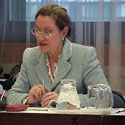General Conference, Eighth session
Daily Highlights: 29 November 1999
Morning plenary meeting
At the invitation of UNIDO Director-General Carlos Magariños, President of Côte d'Ivoire Henri Konan Bédié opened the eighth Session of UNIDO's 168-Member State General Conference on 29 November 1999. Mr. Bédié maintained that there had been a resurgence of economic vitality in Africa and that it was high time for Africa to be fully integrated in the global economy."After emerging from a turbulent period, UNIDO is now demonstrating its vitality in which we are seeing a proliferation of initiatives to develop industry on a planetary scale. UNIDO will enjoy Africa's support the least developed continent", said Mr. Bédié. The General Conference provided a great opportunity for Africa to make its voice heard at the dawn of the third millennium from the rostrum of an organization as prestigious as UNIDO working to promote economic development all over the world, he concluded. (Photo: Mr. Henri Konan Bédié, President of Côte d'Ivoire)
In her address to the Conference, Austrian State Secretary Benita Ferrero-Waldner called for greater financial commitment to UNIDO to help the world's needy reap the benefits of industrialization in the era of globalization. "UNIDO has achieved unprecedented reforms", she added. "Now we must use the reformed instrument of international cooperation that UNIDO has become. We must make available the necessary funds for implementing the integrated programmes. Only when they are implemented, canthey make a difference in the lives of women and men and children." (Photo: Ms. Benita Ferrero-Waldner, Austrian State Secretary)
Addressing the opening of the Conference, UNIDO Director-General Carlos Magariños named three main development challenges facing the world: financing market volatility, inequality of income distribution and environmental deterioration. Mr.Magariños said UNIDO can help reduce the threat of market volatility by strenghtening the conomies of developing countries. He called for third wave in development reforms, stressing that macroeconomic stability in developing countries should be linked to their microeconomic performance. Mr. Magariños explained that first generation development reforms rested on one-off productivity gains while the second generation were based on longer term productivity gains benefitting social and economic infrastructure. A third generation of reforms were needed, he said, "to maintain democratic support for the reform process. It is essential to find mechanisms that make it possible to achieve medium-term productivity gains through the expansion of the private sectors of emerging economies." Mr. Magariños reviewed progress in 1998-99 on the integrated programme approach UNIDO developed for tailoring packages of services to meet the needs of individual client countries. While increased voluntary funding was important for financing these packages, Mr. Magariños emphasized that the political participation of Member States was crucial for the future of UNIDO's work. (Photo: Mr. Carlos Magariños, UNIDO Director-General)
Mr. Shaukat Umer (Pakistan), who was elected President of the Conference, referred to UNIDO as "the standard beacon of the reform process in multilateralism". Mr. Umer emphasized that the comparative advantage of organizations like UNIDO must be utilized in an optimal manner. (Photo: Mr. Magariños, Mr. Umer and Ms. Orlowski)
The Conference elected the following Vice-Presidents: Juan Carlos Kreckler (Argentina), Benita Ferrero-Waldner (Austria), V. Naidunov (Belarus), Thomas Sanon (Burkina Faso), Said Abdulaati Mohamed (Libyan Arab Jamahiriya), O. Pellicer Silva (Mexico), Y.V. Fedotov (Russian Federation), C.S. Poolokasingham (Sri Lanka) and Fugen Ok (Turkey).
Afternoon plenary meeting: UNIDO Forum on Sustainable Industrial Development
Panel 1: "The New Geography of Industry - Insights from Economic Analysis"
President of Côte d'Ivoire Henri Konan Bédié opened the UNIDO Forum on Sustainable Industrial Development, organized within the framework of the UNIDO General Conference, to discuss the future of manufacturing industry as the economic spaces of developed and developing countries as well as economies in transition, were becoming increasingly integrated and different groups of actors were intensifying their integration.
The first, out of five panels, on The New Geography of Industry - Insights from Economic Analysis addressed some of the divergent effects of the globalization process on regional patterns of industrial development, both between various countries and within individual countries, and the different mechanisms of adjustment in the globalization context and their effects. Ghislain Robyn, UNIDO Director of Statistics and Information Networks, moderated the debate on three major topics: the importance of industry in economic development, the interplay between traditional forces of comparative advantage and non-traditional "geographic" determinants in explaining the process of industrial agglomeration that has accompanied the globalization process, and the review of the implications of globalization for the principal "factors" of industrial production, namely, labour and skills, capital and technology.
Panelists' presented papers:
- Ms. Sylvia Delgado of University of Sussex: "How Strong is comparatives advantage? - Stimulating the location of industry"
- Ms. Yuko Kinoshita of CERGE-EI, Charles University in Prague: "Capital flows and technology - Some country-specific evidence"
- Prof. S. Machin of University College London and London School of Economics: "Technology and skills in industry - The international evidence"
Speakers raised many issues related to the underlying impact of globalization on the industrial development prospects of developing countries and economies in transition.



